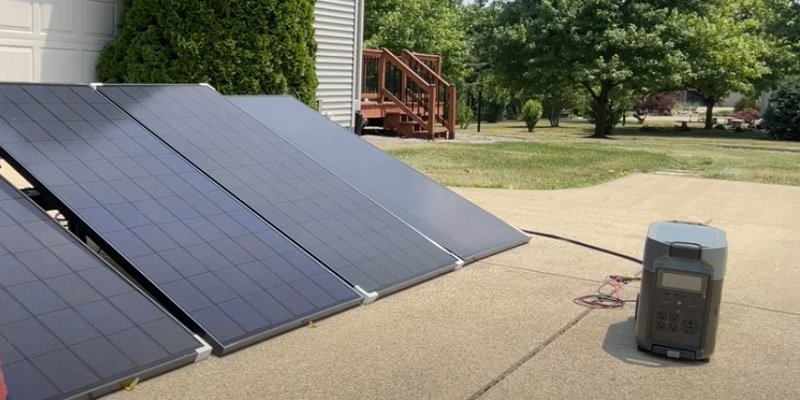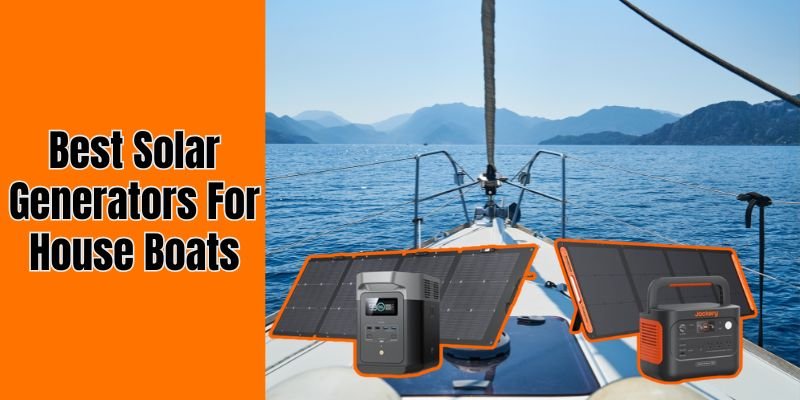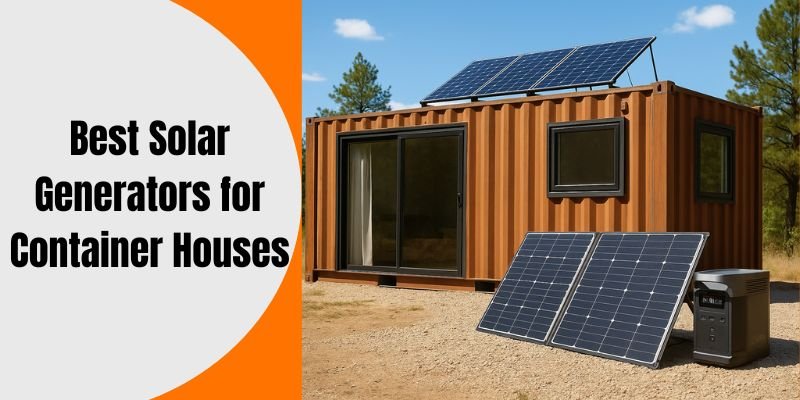Disclosure: This post contains affiliate links and I will be compensated if you make a purchase after clicking through my links. Learn More
Solar generators are a smart choice for clean energy. They harness the sun’s power to keep devices running.
Choosing the right solar generator can be tricky, though. It’s essential to understand what features to prioritize. Some key factors include battery capacity, portability, and power output. Solar generators offer a sustainable solution for power needs, especially in emergencies or outdoor adventures.
They provide electricity without relying on traditional fuels. As more people seek eco-friendly options, the demand for solar generators grows. But not all solar generators are the same. They vary in size, power, and efficiency. Knowing what to look for ensures you get the best value for your money. In this guide, we’ll explore the crucial aspects to consider. This will help you make an informed decision that fits your needs and lifestyle.

Solar Generator Basics
Solar generators offer a clean energy solution for powering devices. Understanding the basics helps you choose the right one. It involves knowing the parts and how they work together. Let’s explore the key components and operation of solar generators.
Key Components
A solar generator has essential parts: solar panels, a battery, and an inverter. Solar panels collect sunlight and convert it into electricity. The battery stores the electricity for later use. The inverter changes stored energy into usable power. This combination allows efficient energy generation and storage.
How It Works
Solar panels absorb sunlight and create direct current (DC) electricity. This energy travels to the battery for storage. The inverter then converts DC into alternating current (AC). AC powers most household devices and appliances. This process allows energy independence from traditional sources.
Power Needs Assessment
Choosing the right solar generator starts with understanding your power needs. Assessing these needs ensures you select a generator that meets your energy demands effectively. This process involves evaluating your energy consumption and device compatibility. A thorough assessment helps avoid overspending or underestimating your requirements. Let’s dive into the key aspects of this assessment.
Energy Consumption
First, consider how much energy you use daily. List essential devices you plan to power. Calculate their combined wattage. This helps determine the generator’s size and capacity. For instance, if you need power for lighting, charging devices, and small appliances, ensure the generator can handle the total wattage. Overloading can damage the generator and connected devices.
Keep in mind, different devices consume varying amounts of energy. A refrigerator uses more power than a smartphone charger. Prioritize devices based on necessity. This way, you can manage energy efficiently and avoid shortages.
Device Compatibility
Check if the generator supports all your devices. Some generators have specific output types like AC, DC, or USB. Ensure compatibility with your devices’ power requirements. Devices with high wattage need generators with higher capacity. Match the generator’s output to your devices’ input specifications.
Also, consider the number of ports available. A generator with multiple outlets provides flexibility. You can connect several devices simultaneously. This feature is useful for powering multiple appliances during a blackout or outdoor activities.
Battery Capacity
Choosing a solar generator starts with understanding its battery capacity. This is crucial for determining how much power it can store and deliver. A solar generator’s battery capacity directly impacts its performance and functionality. Let’s dive deeper into what you need to know.
Watt-hours Explained
Watt-hours measure energy stored in the battery. It indicates how long the battery can power devices. For example, a 500-watt-hour battery can run a 100-watt device for 5 hours. This unit helps you compare different solar generators effectively. Higher watt-hours mean more energy storage and longer usage.
Capacity Vs. Usage
Battery capacity should match your power needs. First, list all devices you plan to charge or run. Then, check their power consumption in watts. Calculate the total watt-hours required for daily use. Choose a generator with sufficient capacity to meet these needs. Remember, overloading the battery can shorten its lifespan. Always aim for a balance between capacity and usage.
Portability Factors
When buying a solar generator, portability is key. Whether you’re off on a camping trip or preparing for emergencies at home, a portable solar generator can be a game-changer. You want something that’s easy to move and doesn’t weigh you down, allowing you to focus on the adventure or the task at hand.
Size And Weight
The size of a solar generator can significantly impact its portability. Smaller units are easier to pack in a car or carry to a campsite. But remember, size also affects power output. A compact generator might be perfect for charging phones and small devices, but it might struggle with larger appliances.
Read More: What Size Solar Generator Do You Need
Weight is another crucial factor. A lightweight generator is ideal for those who need to move it frequently. Think about how often you’ll carry it. If you need something easy to lift, opt for models weighing less than 50 pounds. A friend once brought a heavy generator on a hiking trip and regretted it every step of the way. Don’t make the same mistake.
Transportability
Transportability goes beyond size and weight; it’s about ease of movement. Look for generators with sturdy handles or wheels. They make transportation much easier, especially over rough terrain or long distances.
Consider how you’ll be moving the generator. Will you be lifting it into a car or rolling it along a trail? Each scenario demands different features. A generator with collapsible handles or a sleek design might be perfect for car trips, while rugged wheels could be your best friend on uneven paths.
Reflect on your needs. Are you planning to use the generator for spontaneous road trips or as a backup at home? Your answer will guide your choice. What’s more important: power or portability? Balancing these factors will help you find the right solar generator for your adventures.
Durability And Build Quality
A robust solar generator withstands harsh weather and daily use. Choose models with high-quality materials and sturdy construction. Durable designs ensure longevity and reliable performance.
When buying a solar generator, assessing its durability and build quality is crucial. You want a product that can withstand the elements and the wear and tear of regular use. A robust solar generator ensures long-term reliability and saves you from frequent replacements.
Material Strength
Look closely at the materials used in the solar generator. High-quality materials like aluminum or reinforced plastic can offer better strength. Aluminum is not only lightweight but also resistant to rust, making it ideal for portable use.
Reinforced plastic, on the other hand, can provide excellent impact resistance. This is particularly important if you plan to use your generator during outdoor adventures. Consider the thickness of the casing as well, as a thicker case often means better protection against accidental drops.
Weather Resistance
Imagine you’re camping and a sudden rainstorm hits. Is your solar generator ready for this challenge? Weather resistance is vital to ensure your generator functions well in various conditions. Look for models with a high IP (Ingress Protection) rating, which indicates resistance to dust and water.
A solar generator with an IP rating of IP65, for example, can handle dust and water splashes effectively. This means you can confidently use it in light rain or dusty environments. It’s worth checking if the generator has UV-resistant materials, too, especially if you’ll frequently use it under the sun.
When assessing durability, ask yourself: Will this generator endure unexpected weather changes? Durable and well-built generators not only enhance your outdoor experiences but also provide peace of mind. Choose wisely, and you’ll have a reliable power source for years to come.
Credit: blog.ecoflow.com
Solar Panel Efficiency
Solar panel efficiency plays a crucial role in determining a solar generator’s performance. It defines how well the solar panels convert sunlight into electricity. Higher efficiency means more power is generated even with limited sunlight. This aspect directly affects the overall energy output and cost-effectiveness of the solar generator. Understanding solar panel efficiency is vital for making an informed purchase.
Types Of Panels
There are various types of solar panels available. Monocrystalline panels are known for their high efficiency and sleek look. They perform well in low-light conditions, making them a popular choice. Polycrystalline panels have a lower efficiency but are more affordable. They are ideal for those on a budget. Thin-film panels are lightweight and flexible but offer the lowest efficiency.
Installation Ease
Consider the ease of installing solar panels. Some panels require professional installation, adding extra costs. Others come with user-friendly kits for DIY installation. Portable solar panels offer flexibility and are easy to set up. Check the weight and size of panels for easier handling. Ensure compatibility with your solar generator system.
Inverter And Output Options
Choosing the right solar generator is crucial for uninterrupted power. The inverter and output options are key components to consider. These features determine how effectively the generator converts and delivers energy. Understanding these aspects will help you pick the best generator for your needs.
Ac/Dc Outputs
AC outputs allow you to power household devices. They support appliances like TVs and refrigerators. Check the number of outlets available. More outlets mean more devices can run simultaneously. DC outputs are ideal for charging batteries. They are perfect for mobile devices and smaller electronics.
Inverter Power
Inverter power affects the generator’s efficiency. It converts solar energy into usable power. Higher wattage inverters handle more demanding devices. They are suitable for high-energy appliances. Look for a pure sine wave inverter. It provides stable and clean power. This is crucial for sensitive electronics.
Budget Considerations
Buying a solar generator involves careful budget planning. The initial cost can vary widely. Understanding what you pay for is essential. Explore different models and their benefits. This helps in making a wise choice.
Cost Vs. Features
Consider the balance between cost and features. Some generators are cheaper, but offer fewer features. Others may be expensive but provide advanced options. Decide which features are necessary. Do you need a generator for home use or outdoor trips? The purpose will guide your choice.
Look for features like battery capacity, portability, and power output. Each feature affects the price. A higher capacity battery can power more devices but costs more. Portable models are convenient but might have less power. Decide what fits your needs best.
Long-term Savings
Think about long-term savings. A solar generator can reduce electricity bills. Over time, it pays for itself. Consider maintenance costs too. Solar generators need less upkeep than traditional ones. This saves money in the long run.
Research the lifespan of the generator. A durable model lasts longer and offers more savings. Investing in a quality generator now can lead to future financial benefits. Choose wisely to ensure it meets your long-term needs.
Brand Reputation
When you’re on the hunt for a reliable solar generator, brand reputation is a crucial factor to consider. A well-respected brand often reflects consistent quality, innovation, and customer satisfaction. You want a product backed by a company known for delivering on promises. Think about the peace of mind that comes from knowing your generator won’t let you down when you need it most.
Customer Reviews
Looking at customer reviews is like getting advice from a friend who’s already taken the plunge. They offer real-world insights into performance, durability, and ease of use. Check platforms like Amazon or dedicated solar forums for honest opinions. Do customers rave about the product or share horror stories? Be wary of brands with consistently negative feedback. It’s worth spending extra time reading these reviews to catch any recurring issues.
Warranty And Support
A strong warranty is a sign that a brand stands behind its product. Brands with solid reputations offer warranties that cover a reasonable period and don’t come with hidden catches. You’ll want to ensure your investment is protected. Beyond the warranty, consider the quality of customer support. Is the company easy to reach if something goes wrong? Do they offer clear guidance or leave you hanging? Great support can make all the difference when troubleshooting.
Think about the last time you bought a gadget—did the brand’s reputation affect your decision? It’s the same with solar generators. A reputable brand can mean the difference between a smooth experience and a frustrating ordeal. Always ask yourself: does this brand deserve my trust and money?
Future-proofing
Choosing the right solar generator is important. You want a device that will last. Future-proofing ensures your investment stands the test of time. Technology changes quickly. You need a generator that adapts to these changes. Look for models that offer room to grow. Check for advancements in technology that keep your generator efficient.
Scalability
Scalability is key. It means your generator can expand. As your energy needs grow, your generator should keep up. Some models allow extra solar panels or batteries. This gives more power without buying a new generator. Think long-term. A scalable generator saves money over time.
Technological Advancements
Technology evolves rapidly. You want a generator that uses the latest tech. Look for smart features. Some generators connect to apps. This lets you monitor energy use easily. Efficient models use advanced solar panels. They capture more sunlight. This gives more power with less space.

Credit: www.youtube.com
Frequently Asked Questions
What To Know Before Buying A Solar Generator?
Consider power capacity, battery type, and solar panel compatibility. Check portability, durability, and warranty details. Ensure it meets your energy needs.
What Is A Good Wattage For A Solar Generator?
A good wattage for a solar generator typically ranges from 1000 to 3000 watts. This range accommodates various needs, from charging small devices to powering essential home appliances. Consider your energy requirements to select the appropriate wattage for efficiency and reliability.
How Do I Figure Out What Size Solar Generator I Need?
Calculate your energy needs by listing devices and their wattage. Multiply usage hours to get total watt-hours. Choose a solar generator with 20% more capacity than your total watt-hours. Consider peak sun hours and generator efficiency for accurate sizing.
Will A 2000 Watt Solar Generator Run A Refrigerator?
A 2000 watt solar generator can run most refrigerators. Check the fridge’s wattage requirements before connecting. Most modern fridges use 100-800 watts, suitable for a 2000 watt generator. Ensure the generator has a compatible inverter for smooth operation. Consider energy efficiency and peak power needs.
Final Words
Choosing the right solar generator matters. Consider power needs and battery capacity. Check for portability and ease of use. Look at the charging options available. Compare prices to stay within your budget. Read reviews to learn from others’ experiences. Think about warranties for peace of mind.
Solar generators offer clean energy solutions. They reduce dependence on traditional power sources. Make an informed decision. Enjoy the benefits of renewable energy. Your future self will thank you.








